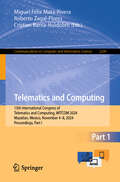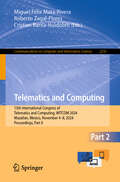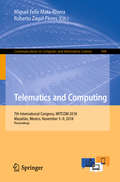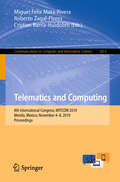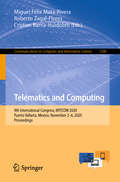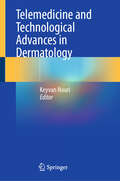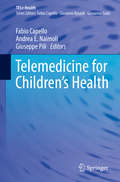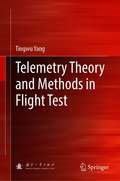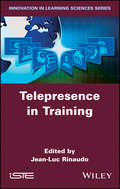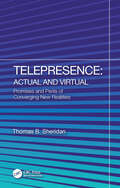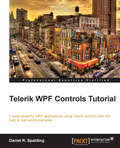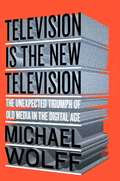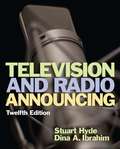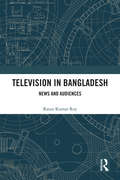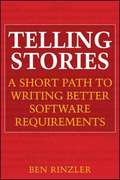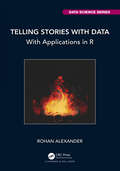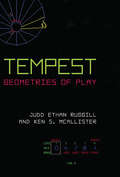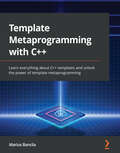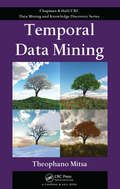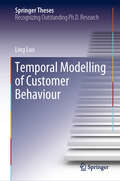- Table View
- List View
Telematics and Computing: 13th International Congress of Telematics and Computing, WITCOM 2024, Mazatlan, Mexico, November 4–8, 2024, Proceedings, Part I (Communications in Computer and Information Science #2249)
by Roberto Zagal-Flores Miguel Félix Mata-Rivera Cristian Barria-HuidobroThis two-volume set constitutes the refereed proceedings of the 13th International Conference on Telematics and Computing , WITCOM 2024, which took place in Mazatlan, Mexico, during November 4–8, 2024. The 41 full papers presented in this volume were carefully reviewed and selected from 91 submissions. The papers focus on the topics of environment monitoring, information systems, IoT, education, artificial intelligence techniques, cybersecurity, data science, and energy, with applications to different case of study.
Telematics and Computing: 13th International Congress of Telematics and Computing, WITCOM 2024, Mazatlan, Mexico, November 4–8, 2024, Proceedings, Part II (Communications in Computer and Information Science #2250)
by Roberto Zagal-Flores Miguel Félix Mata-Rivera Cristian Barria-HuidobroThis two-volume set constitutes the refereed proceedings of the 13th International Conference on Telematics and Computing , WITCOM 2024, which took place in Mazatlan, Mexico, during November 4–8, 2024. The 41 full papers presented in this volume were carefully reviewed and selected from 91 submissions. The papers focus on the topics of environment monitoring, information systems, IoT, education, artificial intelligence techniques, cybersecurity, data science, and energy, with applications to different case of study.
Telematics and Computing: 7th International Congress, WITCOM 2018, Mazatlán, Mexico, November 5-9, 2018, Proceedings (Communications in Computer and Information Science #944)
by Miguel Felix Mata-Rivera Roberto Zagal-FloresThis book constitutes the thoroughly refereed proceedings of the 7th International Congress on Telematics and Computing, WITCOM 2018, held in Mazatlán, Mexico in November 2018.The 23 full papers presented in this volume were carefully reviewed and selected from 57 submissions. They present and organize the knowledge from within the field of telematics and security, data analytics and Machine Learning, IoT and mobile computing.
Telematics and Computing: 8th International Congress, WITCOM 2019, Merida, Mexico, November 4–8, 2019, Proceedings (Communications in Computer and Information Science #1053)
by Miguel Felix Mata-Rivera Roberto Zagal-Flores Cristian Barría-HuidobroThis book constitutes the thoroughly refereed proceedings of the 8th International Congress on Telematics and Computing, WITCOM 2019, held in Merida, Mexico, in November 2019. The 31 full papers presented in this volume were carefully reviewed and selected from 78 submissions. The papers are organized in topical sections: GIS & climate change; telematics & electronics; artificial intelligence & machine learning; software engineering & education; internet of things; and informatics security.
Telematics and Computing: 9th International Congress, WITCOM 2020, Puerto Vallarta, Mexico, November 2–6, 2020, Proceedings (Communications in Computer and Information Science #1280)
by Roberto Zagal-Flores Miguel Félix Mata-Rivera Cristian Barria-HuidobroThis book constitutes the thoroughly refereed proceedings of the 9th International Congress on Telematics and Computing, WITCOM 2020, held in Puerto Vallarta, Mexico, in November 2020. Due to the COVID-19 pandemic the conference was held online. The 28 full papers and 3 short papers in this volume were carefully reviewed and selected from 79 submissions. The papers are focused on the topics of deep and machine learning, cybersecurity, wireless networks, computer vision, communications, and education applied to different sceneries of study and COVID-19.
Telemedicine and Technological Advances in Dermatology
by Keyvan NouriThis book provides a practically applicable guide to the latest applications of telemedicine, imaging technology and artificial intelligence (AI) in dermatology. It introduces these subjects in a clear easy-to follow format ideal for those learning about using technology in modern dermatologic practice. Overviews of the current applications are provided along with detailed discussion of their potential future uses and drawbacks. Emphasis is placed on providing insight into the latest diagnostic non-invasive imaging alternatives to skin biopsy, such as high-resolution ultrasonography, and how AI can enable rapid diagnosis of skin cancer along with its impact in dermatopathology. Telemedicine and Technological Advances in Dermatology reviews the fundamental aspects of telemedicine and how AI is impacting diagnostic and treatment methods in the field. With detailed information on how to apply the latest imaging techniques provided, this book is essential reading for all dermatologists and healthcare professionals who manage diseases of the skin, while providing insights to informaticians and data scientists on applying these technologies to the skin.
Telemedicine for Children's Health
by Fabio Capello Andrea E. Naimoli Giuseppe PiliThis book describes in detail the potential role of ICT and electronic systems, together with the application of Web 2. 0 technologies, in telepediatrics and child health. Rather than simply proposing engineering solutions that may soon become outdated, it is designed to address those real needs that telemedicine and developers are asked to meet. The orientation of the book is very much toward primary care and both low and high-income settings as well as extreme or complex scenarios are considered. The first two sections of the book describe different fields of application, such as the community, the hospital and children with chronic illnesses or special needs, and examine technical issues. The use of telemedicine in delivery of care in extreme rural settings and developing countries is then discussed, with attention also to major emergencies and humanitarian crises. The closing chapters consider the role of modern technologies in the education of caregivers who work with children. Child health is a crucial issue in both industrialized and developing countries. Telemedicine for Children's Health will be an excellent guide to the potential value of telemedicine devices in reducing the burden for children and parents and in offering quick and concrete solutions in low-resource scenarios.
Telemetry Theory and Methods in Flight Test
by Tingwu YangThis book describes systematically telemetry theory and methods for aircraft in flight test. Test targets of telemetry in flight test include airplanes, helicopters, unmanned aerial vehicles, aerostatics, carrier-based aircraft, airborne equipment (systems), weapon systems, (powered) aircraft scale models, aircraft external stores (e.g., nacelle, auxiliary tanks), and ejection seats and so on. The book collects the author's telemetry research work and presents methods that have been verified in real-world tests. The book has eight chapters: the first three discuss the theoretical basis of telemetry, while the other five focus on the methods used in flight tests.Unlike other professional textbooks, this book describes the practical telemetry theory and combines theory and engineering practice to offer a comprehensive and systematic overview of telemetry in flight test for readers.
Teleportation: The Impossible Leap
by David DarlingAn examination of developments in quantum physics which suggest that some form of matter transmission may be possible in the future.
Telepresence in Training
by Jean-Luc RinaudoThe different forms of telepresence in education, in distance learning, in student support, in the use of learning environments or even at the heart of robot systems, are developed in universities and higher education facilities specializing in professional training. They constitute opportunities to reform arguments and give rise to important questions: how should we think about the hierarchy of presence and absence in these techniques in order to make possible “the presence of the absent”? What is the effect on mediation processes? On the perception of the body and on identity? How does it transform collaborative work? Telepresence in Training brings together research that attempts to answer these questions by using studies and practical supports from higher education, with regards to teacher training and telepresence robots in France, Belgium, Switzerland and Quebec.
Telepresence: Promises and Perils of Converging New Realities
by Thomas B. SheridanTelepresence: Actual and Virtual explores the history of telepresence from the 1948 developments of master–slave manipulation, through to current telepresence technology used in space, undersea, surgery and telemedicine, operations in nuclear and other hazardous environments, policing and surveillance, agriculture, construction, mining, warehousing, education, amusement, social media, and other contexts. It also describes the various operator hand and body controls and the corresponding telerobotic actuation of robotic hands, arms, and locomotion. This book reviews the sensing and control technology, its history and likely future, and discusses the many research and policy issues that are raised. The book also takes up key questions relating to social and ethical issues, given that a person’s mechanical reach is becoming unlimited, enabling one to perform mischievous or harmful acts without identification, and what that portends for future developments in telepresence, including regulation and recommended directions of development. The primary audience for this book is professionals interested in human–robot interaction, human factors engineering, virtual reality, applications to space and undersea exploration, telemedicine and telesurgery, firefighting, mechanized agriculture, policing, drone surveillance, warehouse parts' fetching, mining, and military operations.
Telerik WPF Controls Tutorial
by Daniel R. SpaldingThis book follows a hands-on, example-based approach to demonstrate how to efficiently integrate Telerik RadControls within a WPF application. This book is for anyone who plans to use Telerik controls within a WPF application. The reader should have an existing knowledge of C#, SQL, and object-oriented design. The book will focus on the use of objects to populate the controls, so knowledge of object-oriented design is very important.
Television Is the New Television
by Michael Wolff"The closer the new media future gets, the further victory appears." --Michael WolffThis is a book about what happens when the smartest people in the room decide something is inevitable, and yet it doesn't come to pass. What happens when omens have been misread, tea leaves misinterpreted, gurus embarrassed?Twenty years after the Netscape IPO, ten years after the birth of YouTube, and five years after the first iPad, the Internet has still not destroyed the giants of old media. CBS, News Corp, Disney, Comcast, Time Warner, and their peers are still alive, kicking, and making big bucks. The New York Times still earns far more from print ads than from digital ads. Super Bowl commercials are more valuable than ever. Banner ad space on Yahoo can be bought for a relative pittance.Sure, the darlings of new media--Buzzfeed, HuffPo, Politico, and many more--keep attracting ever more traffic, in some cases truly phenomenal traffic. But as Michael Wolff shows in this fascinating and sure-to-be-controversial book, their buzz and venture financing rounds are based on assumptions that were wrong from the start, and become more wrong with each passing year. The consequences of this folly are far reaching for anyone who cares about good journalism, enjoys bingeing on Netflix, works with advertising, or plans to have a role in the future of the Internet.Wolff set out to write an honest guide to the changing media landscape, based on a clear-eyed evaluation of who really makes money and how. His conclusion: the Web, social media, and various mobile platforms are not the new television. Television is the new television.We all know that Google and Facebook are thriving by selling online ads--but they're aggregators, not content creators. As major brands conclude that banner ads next to text basically don't work, the value of digital traffic to content-driven sites has plummeted, while the value of a television audience continues to rise. Even if millions now watch television on their phones via their Netflix, Hulu, and HBO GO apps, that doesn't change the balance of power. Television by any other name is the game everybody is trying to win--including outlets like The Wall Street Journal that never used to play the game at all.Drawing on his unparalleled sources in corner offices from Rockefeller Center to Beverly Hills, Wolff tells us what's really going on, which emperors have no clothes, and which supposed geniuses are due for a major fall. Whether he riles you or makes you cheer, his book will change how you think about media, technology, and the way we live now.From the Hardcover edition.
Television and Radio Announcing, Twelfth Edition
by Stuart Hyde Dina A. IbrahimThe digital revolution has significantly changed broadcast technology. The 12th edition of Television and Radio Announcing reflects new trends in the field, such as the reconfiguration of electronic media production practices and distribution models. The internet and social media have opened up new access to production and new methods of distribution, such as YouTube, Facebook, Twitter, and podcasts. The 12th edition addresses the realities of students who live in this new era.
Television as Digital Media
by James Bennett Niki StrangeIn Television as Digital Media, scholars from Australia, the United Kingdom, and the United States combine television studies with new media studies to analyze digital TV as part of digital culture. Taking into account technologies, industries, economies, aesthetics, and various production, user, and audience practices, the contributors develop a new critical paradigm for thinking about television, and the future of television studies, in the digital era. The collection brings together established and emerging scholars, producing an intergenerational dialogue that will be useful for anyone seeking to understand the relationship between television and digital media. Introducing the collection, James Bennett explains how television as digital media is a non-site-specific, hybrid cultural and technological form that spreads across platforms such as mobile phones, games consoles, iPods, and online video services, including YouTube, Hulu and the BBC's iPlayer. Television as digital media threatens to upset assumptions about television as a mass medium that has helped define the social collective experience, the organization of everyday life, and forms of sociality. As often as we are promised the convenience of the television experience "anytime, anywhere," we are invited to participate in communities, share television moments, and watch events live. The essays in this collection demonstrate the historical, production, aesthetic, and audience changes and continuities that underpin the emerging meaning of television as digital media. Contributors. James Bennett, William Boddy, Jean Burgess, John Caldwell, Daniel Chamberlain, Max Dawson, Jason Jacobs, Karen Lury, Roberta Pearson, Jeanette Steemers, Niki Strange, Julian Thomas, Graeme Turner
Television in Bangladesh: News and Audiences
by Ratan Kumar RoyThis book examines the role of 24/7 television news channels in Bangladesh. By using a multi-sited ethnography of television news media, it showcases the socio-political undercurrents of media practices and the everydayness of TV news in Bangladesh. It discusses a wide gamut of issues such as news making; localised public sphere; audience reaction and viewing culture; impact of rumours and fake news; socio-political conditions; protest mobilization; newsroom politics and perspectives from the ground. An important intervention in the subject, this book will be useful to scholars and researchers of media studies, journalism and mass communication, anthropology, cultural studies, political sociology, political science, sociology, South Asian studies, as well as television professionals, journalists, civil society activists, and those interested in the study of Bangladesh.
Telling Stories
by Ben RinzlerFrom System Designers to Top Management, Everyone loves a good story Once upon a time, it was well understood that stories teach better than plain facts. Why then are most software requirements documents a baffling hodge-podge of diagrams, data dictionaries, and bullet points, held together by little more than a name and a staple? Telling Stories teaches you to combine proven standards of requirements analysis with the most ancient and effective tool for sharing information, the narrative. Telling Stories simplifies and refines the classic methods of Structured Analysis, providing organization, design, and old-fashioned writing advice. Whether you?re just getting started or an experienced requirements writer, Telling Stories can help you turn dull, detailed material into an engaging, logical, and readable story, a story that can make the difference for your project and your career. Learn why readers believe and remember what they learn from stories Work with team members to gather content, tell their stories, and win their support Use stories to find every requirement Create diagrams that almost tell the story on their own (while looking clear and professional) Explain everything important about a process Use precise language to remove the ambiguity from requirements Write a forceful executive summary that stands on its own and sells a project to senior management Summarize often to keep the reader focused on key issues Structure the document so every part has a clear place and purpose
Telling Stories with Data: With Applications in R (Chapman & Hall/CRC Data Science Series)
by Rohan AlexanderThe book equips students with the end-to-end skills needed to do data science. That means gathering, cleaning, preparing, and sharing data, then using statistical models to analyse data, writing about the results of those models, drawing conclusions from them, and finally, using the cloud to put a model into production, all done in a reproducible way. At the moment, there are a lot of books that teach data science, but most of them assume that you already have the data. This book fills that gap by detailing how to go about gathering datasets, cleaning and preparing them, before analysing them. There are also a lot of books that teach statistical modelling, but few of them teach how to communicate the results of the models and how they help us learn about the world. Very few data science textbooks cover ethics, and most of those that do, have a token ethics chapter. Finally, reproducibility is not often emphasised in data science books. This book is based around a straight-forward workflow conducted in an ethical and reproducible way: gather data, prepare data, analyse data, and communicate those findings. This book will achieve the goals by working through extensive case studies in terms of gathering and preparing data, and integrating ethics throughout. It is specifically designed around teaching how to write about the data and models, so aspects such as writing are explicitly covered. And finally, the use of GitHub and the open-source statistical language R are built in throughout the book. Key Features: Extensive code examples. Ethics integrated throughout. Reproducibility integrated throughout. Focus on data gathering, messy data, and cleaning data. Extensive formative assessment throughout.
Temperature- and Supply Voltage-Independent Time References for Wireless Sensor Networks
by Wim Dehaene Georges Gielen Valentijn De SmedtThis book investigates the possible circuit solutions to overcome the temperature and supply voltage-sensitivity of fully-integrated time references for ultra-low-power communication in wireless sensor networks. The authors provide an elaborate theoretical introduction and literature study to enable full understanding of the design challenges and shortcomings of current oscillator implementations. Furthermore, a closer look to the short-term as well as the long-term frequency stability of integrated oscillators is taken. Next, a design strategy is developed and applied to 5 different oscillator topologies and 1 sensor interface. All 6 implementations are subject to an elaborate study of frequency stability, phase noise and power consumption. In the final chapter all blocks are compared to the state of the art.
Tempest: Geometries Of Play
by Judd Ethan Ruggill Ken S. McallisterAtari's 1981 arcade hit Tempest was a "tube shooter" built around glowing, vector-based geometric shapes. Among its many important contributions to both game and cultural history, Tempest was one of the first commercial titles to allow players to choose the game's initial play difficulty (a system Atari dubbed "SkillStep"), a feature that has since became standard for games of all types. Tempest was also one of the most aesthetically impactful games of the twentieth century, lending its crisp, vector aesthetic to many subsequent movies, television shows, and video games. In this book, Ruggill and McAllister enumerate and analyze Tempest's landmark qualities, exploring the game's aesthetics, development context, and connections to and impact on video game history and culture. By describing the game in technical, historical, and ludic detail, they unpack the game's latent and manifest audio-visual iconography and the ideological meanings this iconography evokes.
Template Metaprogramming with C++: Learn everything about C++ templates and unlock the power of template metaprogramming
by Marius BancilaUnderstand how to use modern C++ templates for writing maintainable, robust, and fast softwareKey FeaturesGrasp the fundamentals of and learn to write effective C++ templatesGet up to speed with the latest C++20 template features such as constraints and conceptsExplore different patterns and idioms to integrate templates in your program designBook DescriptionLearn how the metaprogramming technique enables you to create data structures and functions that allow computation to happen at compile time. With this book, you'll realize how templates help you avoid writing duplicate code and are key to creating generic libraries, such as the standard library or Boost, that can be used in a multitude of programs. The introductory chapters of this book will give you insights into the fundamentals of templates and metaprogramming. You'll then move on to practice writing complex templates and exploring advanced concepts such as template recursion, template argument deduction, forwarding references, type traits, and conditional compilation. Along the way, you'll learn how to write variadic templates and how to provide requirements to the template arguments with C++20 constraints and concepts. Finally, you'll apply your knowledge of C++ metaprogramming templates to implement various metaprogramming patterns and techniques. By the end of this book, you'll have learned how to write effective templates and implement metaprogramming in your everyday programming journey.What you will learnUnderstand the syntax for all types of templatesDiscover how specialization and instantiation worksGet to grips with template argument deduction and forwarding referencesWrite variadic templates with easeBecome familiar with type traits and conditional compilationRestrict template arguments in C++20 with constraints and conceptsImplement patterns such as CRTP, mixins, and tag dispatchingWho this book is forThis book is for beginner-to-intermediate C++ developers who want to learn about template metaprogramming as well as advanced C++ developers looking to get up to speed with the new C++20 features related to templates and the the various idioms and patterns. Basic C++ coding experience is necessary to get started with this book.
Temporal Data Mining
by Theophano MitsaFrom basic data mining concepts to state-of-the-art advances, this book covers the theory of the subject as well as its application in a variety of fields. It discusses the incorporation of temporality in databases as well as temporal data representation, similarity computation, data classification, clustering, pattern discovery, and prediction. The book also explores the use of temporal data mining in medicine and biomedical informatics, business and industrial applications, web usage mining, and spatiotemporal data mining. Along with various state-of-the-art algorithms, each chapter includes detailed references and short descriptions of relevant algorithms and techniques described in other references.
Temporal Logics in Computer Science
by Stéphane Demri Valentin Goranko Martin LangeThis comprehensive text provides a modern and technically precise exposition of the fundamental theory and applications of temporal logics in computer science. Part I presents the basics of discrete transition systems, including constructions and behavioural equivalences. Part II examines the most important temporal logics for transition systems and Part III looks at their expressiveness and complexity. Finally, Part IV describes the main computational methods and decision procedures for model checking and model building - based on tableaux, automata and games - and discusses their relationships. The book contains a wealth of examples and exercises, as well as an extensive annotated bibliography. Thus, the book is not only a solid professional reference for researchers in the field but also a comprehensive graduate textbook that can be used for self-study as well as for teaching courses.
Temporal Modelling of Customer Behaviour (Springer Theses)
by Ling LuoThis book describes advanced machine learning models – such as temporal collaborative filtering, stochastic models and Bayesian nonparametrics – for analysing customer behaviour. It shows how they are used to track changes in customer behaviour, monitor the evolution of customer groups, and detect various factors, such as seasonal effects and preference drifts, that may influence customers’ purchasing behaviour. In addition, the book presents four case studies conducted with data from a supermarket health program in which the customers were segmented and the impact of promotional activities on different segments was evaluated. The outcomes confirm that the models developed here can be used to effectively analyse dynamic behaviour and increase customer engagement. Importantly, the methods introduced here can also be used to analyse other types of behavioural data such as activities on social networks, and educational systems.
Temporal and Spatial Environmental Impact of the COVID-19 Pandemic (Advances in Geographical and Environmental Sciences)
by Mohd Akhter Ali M. KamrajuThis book identifies, evaluates and reports the impacts of the COVID-19 pandemic on the physical, biological and socioeconomic environment, using the science and technology of geoinformatics. It encourages the environmental considerations in the future city and policy planning and decision-making. For example, according to the World Health Organization, 80% of people living in cities are exposed to polluted air that exceeds healthy levels. City planners have applied the developing concepts of sustainability to modern debates over how cities and regions should be reviewed, regenerated and reformed since the introduction of the concept in developmental science. During the COVID-19 pandemic, a remarkable drop in air pollution has been observed in India and other countries, which has accelerated the shift to green and sustainable development. Geoinformatics can provide solutions and resources for local, sustainable activities in education, health, sustainable agriculture, resource management and related fields. This book serves researchers in a variety of areas, including hazards, land surveys, remote sensing, cartography, geophysics, geology, natural resources, environment and geography.
